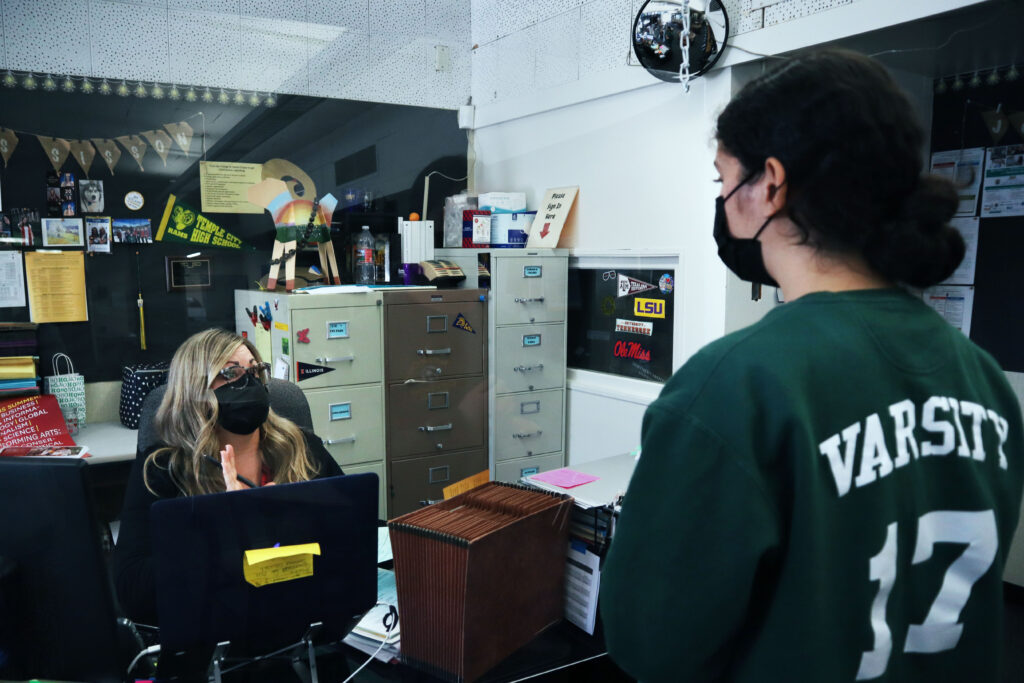
PHOTO/ Ella Chan In the College and Career Center, C&CC Technician Amy Sisson helps junior Leilani Carmona submit her work permit and set up a meeting to review work expectations. Carmona begins working on Feb. 5.
By Claire Denne, Staff Writer
Students walking past storefronts adorned with ‘Help Wanted’ signs offering jobs at higher wages than usual may be interested in pursuing these job opportunities. They can take advantage of the current favorable job market by visiting the College and Career Center. It offers resources to help students in the job search and application process, as well as students interested in future military involvement and volunteer work.
“There’s something about working with the public, kids grow so much when I first issue their work permit to when I see them as seniors,” College and Career Center technician Amy Sisson said. “They are completely different human beings, and there’s nothing like a little job experience and having the freedom to be able to work and gain that experience that helps you grow as a human being.”
The C&CC offers resources and help with work permits, job searches and creating a resume.
Work permits are legal documents required by the state that allows minors to hold a job while complying with child labor laws. They can be found in the C&CC.
When preparing for interviews, Sisson advises students to ask about the expectations of employees beforehand. Sisson and the counselors can also help students gauge how much time they can realistically dedicate to a job.
Before applying, students need to maintain their grades at a 2.0 GPA with no more than one F on their transcript and have good attendance. Transportation and location are other important factors in finding workplaces to apply to.
The C&CC class on Canvas features advertised positions from nearby workplaces, such as McDonald’s or Kumon. Students can also find these resources in the center on campus and the Instagram page.
“Student workers would learn a lot more about negotiation and making tough decisions if they had to sort out scheduling or other issues with their employers themselves,” junior Nathan Tsai said. “Working during school days takes a toll on the academic side of things, so the way to balance your time is to figure out your priorities and make the necessary sacrifices accordingly.”
Students can also fill their time productively with volunteer positions. Students can check if their volunteer opportunities comply with nonprofit requirements through counselors or on the website melissa.com/v2/lookups/npo/. Students apply to volunteer within their schedule or during the summer when they have more free time.
Students interested in joining the military must meet with a recruiter, who can be contacted through Sisson. Students may receive calls from recruiters if they have not opted out of sharing their information.
A meeting with a recruiter will involve parents or guardians and provides information about career trajectories, ways to enlist and initial commitments. Information provided depends on the specific military branch.
Benefits to joining the military include health insurance, a pension, retirement benefits as well as the G.I. Bill, which pays for veterans’ college, graduate school and training programs.
Students can still attend college while training with the military through Reserve Officers’ Training Corps scholarships, which allow students to attend college for free with a stipend while they train occasionally. Seniors apply for the ROTC scholarship in January along with the colleges they plan to attend.
“It’s important to look at what’s doable within your schedule, especially if you start when you’re younger,” counselor Kristen Castro said. “Everybody has a different comfort zone, but it’s just really encouraging them to start really.”
Sisson recommends that students take initiative in looking for other opportunities by visiting the C&CC, asking counselors and listening to the biweekly bulletin.
